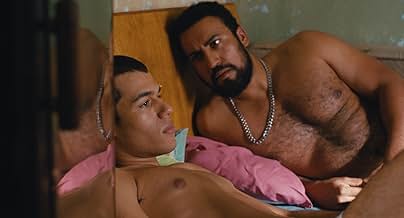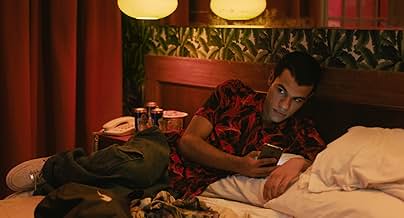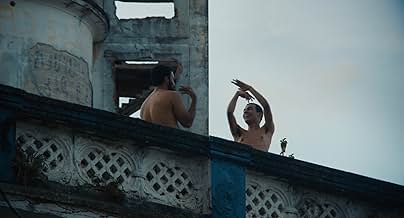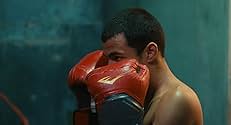Nach der Entlassung aus einer Jugendstrafanstalt findet sich Wellington obdachlos in São Paulo wieder. In einem Pornokino entsteht mit Ronaldo, der ihm Arbeit im Rotlichtmilieu verschafft, e... Alles lesenNach der Entlassung aus einer Jugendstrafanstalt findet sich Wellington obdachlos in São Paulo wieder. In einem Pornokino entsteht mit Ronaldo, der ihm Arbeit im Rotlichtmilieu verschafft, eine ambivalente Beziehung.Nach der Entlassung aus einer Jugendstrafanstalt findet sich Wellington obdachlos in São Paulo wieder. In einem Pornokino entsteht mit Ronaldo, der ihm Arbeit im Rotlichtmilieu verschafft, eine ambivalente Beziehung.
- Regie
- Drehbuch
- Hauptbesetzung
- Auszeichnungen
- 28 Gewinne & 11 Nominierungen insgesamt
Marcelo Varzea
- Alexandre
- (as Marcelo Várzea)
Empfohlene Bewertungen
Interesting to see how people with little resources are living their life in the underworld of Sao Paolo, selling their bodies or (re)selling drugs. They do whatever may bring some income, allowing them to carry on in survival mode. Apart from being sort of a documentary, unintended perhaps, it also tells a romantic story. The relationship between Wellington/Baby and Ronaldo breaks several times and rekindles even so many times. In that respect, gay and straight relationships look not much different. That love survives everything in the end, is something we already learned from kitchen-sink-novels. For me, extrapolating it to the world of gay people, is however not the unique selling point for this movie.
In this case the story about Wellington's father (a policeman, known for his bad temper) is an extra conflict element, a logical reaction when his son announces he is attracted to men and men only. Obviously, parental love does not survive anything, at least not with a strict, law&order redneck father. It may be not the primary reason that Wellington's parents moved out of town without leaving a forwarding address, but it contributed significantly to their decision to break the connection, abandoning him, not even visiting him once in the detention center.
The story and its subsequent developments kept my attention. Still, I had expected more of it, though I cannot pinpoint what I really missed. Nearly all the people involved in this movie try to survive and to cope with their dire circumstances. I've read the actors were non-professional, picked from the Sao Paolo streets, so actually having been part of the world portrayed here. Whatever their backgrounds or acting training, their performances are convincing and believable.
Although this is a coming-of-age story all over, it is very different from the usual coming-of-age movies where the main protagonist starts from leading a happy and carefree life, suddenly interrupted by a drastic, invasive event, after which a transformation starts into a useful life. This movie did not start with the usual endless partying, caring about clothes and looks, and courting the other sex as main part of the day. That makes it stand out from the usual coming-of-age movies.
All in all, I may have left the venue with a feeling that I got less than expected, but in retrospect I cannot determine what it was that I missed. It may be that I find Wellington/Baby's personality underdeveloped, and we know only his short-term goals (finding his parents, earning some money, etc). Anyway, the documentary aspect and the casting of real-life actors, non-pros picked from the streets of Soa Paolo, contributes significantly to its value. And finally, the continuous on-off relationship between Baby and Ronaldo, is also interesting while not so common with gay relationships, especially given their age difference. Enough remains to mark this movie as valuable and a recommended watch. Finally, as assurance for those abhorred by gay sex, there is nudity but no "action" visible on screen.
In this case the story about Wellington's father (a policeman, known for his bad temper) is an extra conflict element, a logical reaction when his son announces he is attracted to men and men only. Obviously, parental love does not survive anything, at least not with a strict, law&order redneck father. It may be not the primary reason that Wellington's parents moved out of town without leaving a forwarding address, but it contributed significantly to their decision to break the connection, abandoning him, not even visiting him once in the detention center.
The story and its subsequent developments kept my attention. Still, I had expected more of it, though I cannot pinpoint what I really missed. Nearly all the people involved in this movie try to survive and to cope with their dire circumstances. I've read the actors were non-professional, picked from the Sao Paolo streets, so actually having been part of the world portrayed here. Whatever their backgrounds or acting training, their performances are convincing and believable.
Although this is a coming-of-age story all over, it is very different from the usual coming-of-age movies where the main protagonist starts from leading a happy and carefree life, suddenly interrupted by a drastic, invasive event, after which a transformation starts into a useful life. This movie did not start with the usual endless partying, caring about clothes and looks, and courting the other sex as main part of the day. That makes it stand out from the usual coming-of-age movies.
All in all, I may have left the venue with a feeling that I got less than expected, but in retrospect I cannot determine what it was that I missed. It may be that I find Wellington/Baby's personality underdeveloped, and we know only his short-term goals (finding his parents, earning some money, etc). Anyway, the documentary aspect and the casting of real-life actors, non-pros picked from the streets of Soa Paolo, contributes significantly to its value. And finally, the continuous on-off relationship between Baby and Ronaldo, is also interesting while not so common with gay relationships, especially given their age difference. Enough remains to mark this movie as valuable and a recommended watch. Finally, as assurance for those abhorred by gay sex, there is nudity but no "action" visible on screen.
I watched "Baby" way back in January but due to time constraints it's only getting a review now. Gladly, I haven't forgotten a thing
about it, it was pleasantly stuck in my head and it's such a marvelous film that I can't wait to see it again. This is Brazilian cinema at its
greatest, and queer cinema as it greatest as well, and director Marcelo Caetano (from the equally great "Corpo Elétrico") strikes again with
another powerfully memorable story on love and relationships on the gay underworld.
We follow the 18-year-old Wellington (João Pedro Mariano), a boy just released from a juvenile facility after spending some time there for a crime he committed and he finds himself out and homeless as his family moved out of town without telling him. After jumping the turnstiles of a porn theater, he meets Ronaldo (Ricardo Teodoro), a late 30's bisexual guy, sort of a bouncer of the place who sells drugs and his body to whoever men who wants him, and he takes the youngster under his care, to his home providing food, shelter and a job opportunity. The latter comes in two forms, first as a hookup partner where they satisfy the pleasure of male voyeurs who fancy the good looking teen (later nicknamed Baby), and later they sell drugs on the downtown area of São Paulo, under the obversation of a bossy drug dealer who also has a thing for Wellington. Besides the street dealings, Ronaldo will try to help Baby in finding his mother, and even presents him to his own family of whom they have a friendly relationship despite no longer being married.
They soon fall in love with each other despite their many differences, as they both realize they need each other. And it's interesting to notice how the game changes as for who needs the other the most. If at first, Baby depends on basically everything from Ronaldo because he has nothing and a father figure was most needed for the boy, but it's Ronaldo who ends up emotionally dependent on the boy, not just being partners in bed and in crime, but he feels better, different with Baby, and it takes a huge toll on their relationship when Baby is approached by a wealthy older guy who's in love with him and jealousy and possession takes over Ronaldo. Here's two lost souls trying to find a way to improve their lives, living on a tightrope of emotions and situations, at times being complete with each other but not knowing how to keep this love alive, without succumbing to their problems.
I was really blown away with this movie. Incredible performances from the cast (the newcomer João Pedro Mariano is a phenomenon, just as Ricardo Teodoro. Their moments together, either the dialogue moments or the sexy bits are something out of this world), the story and its transitions that despite some sadness and some darkness finds a way to inject moments of humor and plenty of tenderness. It's a cute story but it's not the typical fare of hyper happy/positive stuff gay films are doing lately but it's cute and lovely (their dance sequence at the top of a known abandoned building in Bom Retiro is incredibly beautiful); sure, there are some dark corners as well (when Baby gets taken by the police, that was tense) but it finds its way to escape old cliches from similar themed films.
And ultimately it tells a great story about love, friendship, hope for better things and the unexpected ways of life. "Baby" was of such magnitude and realism that it truly felt as life being captured and not a film unfolding before your eyes. 10/10.
We follow the 18-year-old Wellington (João Pedro Mariano), a boy just released from a juvenile facility after spending some time there for a crime he committed and he finds himself out and homeless as his family moved out of town without telling him. After jumping the turnstiles of a porn theater, he meets Ronaldo (Ricardo Teodoro), a late 30's bisexual guy, sort of a bouncer of the place who sells drugs and his body to whoever men who wants him, and he takes the youngster under his care, to his home providing food, shelter and a job opportunity. The latter comes in two forms, first as a hookup partner where they satisfy the pleasure of male voyeurs who fancy the good looking teen (later nicknamed Baby), and later they sell drugs on the downtown area of São Paulo, under the obversation of a bossy drug dealer who also has a thing for Wellington. Besides the street dealings, Ronaldo will try to help Baby in finding his mother, and even presents him to his own family of whom they have a friendly relationship despite no longer being married.
They soon fall in love with each other despite their many differences, as they both realize they need each other. And it's interesting to notice how the game changes as for who needs the other the most. If at first, Baby depends on basically everything from Ronaldo because he has nothing and a father figure was most needed for the boy, but it's Ronaldo who ends up emotionally dependent on the boy, not just being partners in bed and in crime, but he feels better, different with Baby, and it takes a huge toll on their relationship when Baby is approached by a wealthy older guy who's in love with him and jealousy and possession takes over Ronaldo. Here's two lost souls trying to find a way to improve their lives, living on a tightrope of emotions and situations, at times being complete with each other but not knowing how to keep this love alive, without succumbing to their problems.
I was really blown away with this movie. Incredible performances from the cast (the newcomer João Pedro Mariano is a phenomenon, just as Ricardo Teodoro. Their moments together, either the dialogue moments or the sexy bits are something out of this world), the story and its transitions that despite some sadness and some darkness finds a way to inject moments of humor and plenty of tenderness. It's a cute story but it's not the typical fare of hyper happy/positive stuff gay films are doing lately but it's cute and lovely (their dance sequence at the top of a known abandoned building in Bom Retiro is incredibly beautiful); sure, there are some dark corners as well (when Baby gets taken by the police, that was tense) but it finds its way to escape old cliches from similar themed films.
And ultimately it tells a great story about love, friendship, hope for better things and the unexpected ways of life. "Baby" was of such magnitude and realism that it truly felt as life being captured and not a film unfolding before your eyes. 10/10.
Released from juvenile detention, 18-year-old Wellington finds that his parents have run away from him, leaving without forwarding address or phone number. He is taken in by Ronaldo, a male escort more than twice his age, and who also deals drugs on the side. When their 1st joint expedition does not go fully as planned, Ronaldo calls Wellington a baby, which he then adopts as his name. Theirs is a turbulent relationship. Ronaldo and his separated-from-him family help Baby find his mother. However, Ronaldo wants exclusive use of Baby's time, which leads to conflicts.
Enough snippets of their life is shown - doing sex work, dealing drugs, and just being together. But Wellington has other interests, like finding a sugar daddy, or his street drag busker buddies.
Enough snippets of their life is shown - doing sex work, dealing drugs, and just being together. But Wellington has other interests, like finding a sugar daddy, or his street drag busker buddies.
Wusstest du schon
- WissenswertesCompared by critics to Wong Kar-Wai's Chungking Express (1994) and Glücklich vereint (1997). These are reportedly some of director Marcelo Caetano's favorite movies, "but I like to emphasize that my own came to life from Brazilian traditions."
- VerbindungenReferences Sao Paulo (1965)
- SoundtracksLaissez-moi Danser
(Voglio l'Anima)
Music by Toto Cutugno
Italian lyrics by Cristiano Minellono
French lyrics by Pierre Delanoë
Performed by Dalida
Top-Auswahl
Melde dich zum Bewerten an und greife auf die Watchlist für personalisierte Empfehlungen zu.
Details
- Laufzeit1 Stunde 47 Minuten
- Farbe
- Seitenverhältnis
- 1.85 : 1
Zu dieser Seite beitragen
Bearbeitung vorschlagen oder fehlenden Inhalt hinzufügen




















